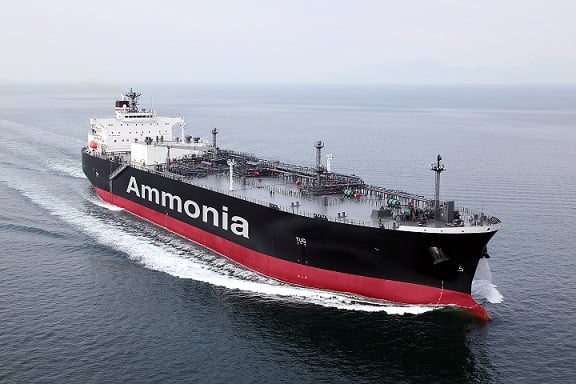Home Ammonia Without new regulations, ammonia as marine fuel poses great risk to public health, MIT study finds
July 23, 2024,
by
Ajsa Habibic
Switching ships to ammonia fuel under current legislation can have a worsening effect on air quality and impact public health, leading to about 600,000 additional premature deaths each year, a new study from the Massachusetts Institute of Technology (MIT) warns.

The study titled “Climate and air quality impact of using ammonia as an alternative shipping fuel” was conducted by an interdisciplinary team of researchers from MIT and elsewhere, funded by the MIT Climate and Sustainability Consortium.
Currently, it is estimated that the maritime industry accounts for almost 3% of global CO2 emissions and the industry’s negative impacts on air quality cause about 100,000 premature deaths annually.
While switching to ammonia as a sustainable fuel is often pitched as one potential solution to decarbonize shipping, the MIT study indicates that burning ammonia for maritime fuel could further worsen air quality and lead to devastating public health impacts, unless it is adopted alongside strengthened emissions regulations.
Ammonia combustion generates nitrous oxide (N2O), a greenhouse gas that is about 300 times more potent than CO2. It also emits nitrogen in the form of nitrogen oxides (NO and NO2, referred to as NOx), and unburnt ammonia may slip out, which eventually forms fine particulate matter in the atmosphere. These tiny particles can be inhaled deep into the lungs, causing health problems like heart attacks, strokes, and asthma.
The new study indicates that, under current legislation, switching the global fleet to ammonia fuel could cause up to about 600,000 additional premature deaths each year. However, with stronger regulations and cleaner engine technology, the switch could lead to about 66,000 fewer premature deaths than currently caused by maritime shipping emissions, with far less impact on global warming.
Traditionally, ammonia is made by stripping hydrogen from natural gas and combining it with nitrogen at extremely high temperatures which is often associated with a large carbon footprint. However, the maritime shipping industry is betting on the development of “green ammonia,” which is produced by using renewable energy to make hydrogen via electrolysis and to generate heat.
“In theory, if you are burning green ammonia in a ship engine, the carbon emissions are almost zero,” Anthony Wong, a postdoc in the MIT Center for Global Change Science and lead author of the study, explained. “Saying that ammonia is a ‘clean’ fuel is a bit of an overstretch. Just because it is carbon-free doesn’t necessarily mean it is clean and good for public health.”
Painting the whole picture
The study investigated the environmental and public health impacts of switching the global fleet to ammonia fuel through scenarios designed to measure how pollutant impacts change under certain technology and policy assumptions.
From a technological point of view, the researchers considered two ship engines. The first burns pure ammonia, which generates higher levels of unburnt ammonia but emits fewer nitrogen oxides. The second engine technology involves mixing ammonia with hydrogen to improve combustion and optimize the performance of a catalytic converter, which controls both nitrogen oxides and unburnt ammonia pollution.
They also considered three policy scenarios: current regulations, which only limit nitrogen oxide emissions in some parts of the world; a scenario that adds ammonia emission limits over North America and Western Europe; and a scenario that adds global limits on ammonia and nitrogen oxide emissions.
The researchers used a ship track model to calculate how pollutant emissions change under each scenario and then fed the results into an air quality model which calculates the impact of ship emissions on particulate matter and ozone pollution. Finally, they estimated the effects on global public health.
At this stage, the researchers relied on experimental ammonia combustion data from collaborators to build their model since there are no real-world data and ammonia-powered ships sailing the seas.
Importance of updated shipping emissions regulations
As a result, the study found that with no new regulations and ship engines that burn pure ammonia, switching the entire fleet would cause 681,000 additional premature deaths each year.
“While a scenario with no new regulations is not very realistic, it serves as a good warning of how dangerous ammonia emissions could be. And unlike NOx, ammonia emissions from shipping are currently unregulated,” Wong said.
According to the findings, even without new regulations, using cleaner engine technology would cut the number of premature deaths down to about 80,000, which is about 20,000 fewer than are currently attributed to maritime shipping emissions. With stronger global regulations and cleaner engine technology, the number of people killed by air pollution from shipping could be reduced by about 66,000.
When it comes to ammonia’s impacts on air quality, it was indicated that thet would not be felt uniformly across the globe, and addressing them fully would require coordinated strategies across very different contexts.
The study concluded that most premature deaths would occur in East Asia, since air quality regulations are less stringent in this region and higher levels of existing air pollution cause the formation of more particulate matter from ammonia emissions. In addition, shipping volume over East Asia is far greater than elsewhere on Earth, compounding these negative effects.
In the future, the researchers intend to continue refining their analysis, expecting to use these findings as a starting point to urge the marine industry to share engine data they can use to better evaluate air quality and climate impacts. They also hope to inform policymakers about the importance and urgency of updating shipping emission regulations.
-

Posted: 5 months ago





